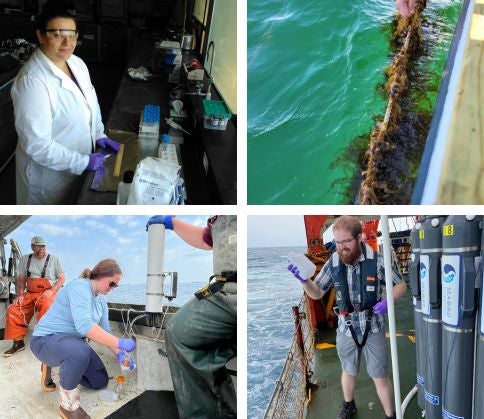Motion: On
Motion: Off
Contrast: Standard
Contrast: High
Apply site-wide
Work to understand the chemistry of the ocean and the behavior of elements within it.
Chemical oceanographers study the chemical composition of seawater and how it is affected by physical mixing processes and by interactions with the atmosphere, the biosphere, and the sediments and rocks that form the seafloor.
Topics
- Climate Change
- Deep Microbes
- Oceanic Volcanic Activity
- Ocean-Atmosphere Interactions
- Microbial and Planktonic Diversity
- Food Web Dynamics
- Monitoring and Water Quality
- Science for Coastal Management

Research
| Name | Title | Themes |
|---|---|---|
| Jitka Becanova | Assistant Research Professor | Dr. Becanova combines her expertise in analytical chemistry and environmental engineering with research focusing on emerging environmental contaminants such as PFAS, with a particular emphasis on the development of new technologies for their detection and remediation. |
| Rainer Lohmann | Professor | Dr. Lohmann’s research interests combine marine organic geochemistry and environmental chemistry. He leads the URI STEEP Superfund Center, which studies the sources, transport, exposure and effects of PFAS. |
| Brice Loose | Associate Professor | Dr. Loose studies processes at the boundary between biogeochemistry and physical oceanography, with a strong focus on the polar oceans. |
| Arthur Spivack | Professor | Dr. Spivack’s work is principally focused on understanding the controls and climactic feedbacks on atmospheric carbon dioxide levels, past ocean circulation, as well as the nature and activity of microbial life in the seafloor. |
| Hongjie Wang | Assistant Professor | The Ocean Carbon Lab studies the biogeochemistry of seawater and sediments to answer fundamental questions related to carbon and oxygen cycles in the context of climate change and anthropogenic stressors in ocean systems. |
Researchers
Assistant Research Professor of Oceanography
Professor of Oceanography
401.874.6612
rlohmann@uri.edu
Associate Professor of Oceanography
401.874.6676
bloose@uri.edu
Professor of Oceanography
401.874.6200
spivack@uri.edu
Assistant Professor of Oceanography
401.874.6141
hwang@uri.edu





